人教版新目标初中英语八年级上册How often do you exercise教案2篇
-
- 页数:21页
- 字数:约 19905 字
- 大小:182.50KB
- 格式:.doc
- 版本:Office2016及以上版本
- 作者:zero设计
How often do you exercise教案2篇
Howoften do you exercise?教案一
单元目标与要求
1.能够谈论自己、朋友或他人平时的活动,如:I often go tomovies. He sometimes watches TV.等。
2.能够谈论自己、朋友或他人平时活动的频率,如:I shop once amonth. He watches TV twice a week..等。

3.能听、说、读、写课后但此表中的黑体重点词汇和Grammar Focus 的重点句型。
4.能够听、说、读A、B部分Pairwork中的对话;能够听懂简单的听力内容,并完成回答。
5.能够理解Read中的大致内容,并能解决相应的问题。
6.能够理解比并且完成Groupwork 和 Survey 。
7.在Self-check 中完成综合运用,检验对本单元的掌握程度。
8.通过本单元的学习,能引导学生关注自己以及身边的人对于日常生活的安排,养成合理安排生活起居及饮食好习惯。倡导健康生活,健康起居。
课时安排4课时
第一课时:Section A (1a—2c)
第二课时:Section A (3—4)
第三课时:Section B (1a—2c)
第四课时:Section B (3a—4)
Period 1
教学内容与分析
教学内容:(Section A 1a—2c)
教学目标:
a. 能够听、说、读、写平时的活动:exercise, go skateboarding。
b.能够听、说、认读句子:What do you usually do on weekends?I often go to the movies.What does she do on weekends? She sometimes watches TV.并能运用这些句型来描述自己和他人的平时活动。
c. 能够听、说、认读句子:How often do you shop? I shop once amonth并能用这些句型谈论自己、朋友或他人平时活动的频率。
教学重点、难点分析:
教学重点:能够听、说、读、写自己、朋友或他人平时的活动以及活动的频率并在实际情景中运用自如。
教学难点:能够准确运用词汇来区分不同的频率,而掌握代表不同频率的词汇本身也是本课时的教学难点。
课前准备
教师准备主情景图的教学挂图。
教师为制作多媒体课件,在网上搜索相关资料。
教师准备磁带和录音机。
教师设计
教学步骤
建议和说明
Step 1 Greetings
Greet with Ss
T:Welcome back to school,boys and girls.How are you?
How time flies!Our summer vacation was over.
How was your vacation?
Did you enjoy your summer vacation?
Was it interesting,exciting or relaxing?
Would you like to tell us?
Encourage Ss to share their vacation with the whole class.
Step 2 Presentation and Practice
Ask Ss:Well,do you still remember your last vacaton?
How did you spend it?
Was it the same as this summer vacation?
So what do you often do in your summer vacation?
Then show some phrases for Ss to practice. Then present as following:
always>usually>often>sometimes>hardly ever(几乎没有) >never
and let them understand their differences at the first time.
After that ask Ss try to answer the question above,according to their own situation,using always,usually,often,sometimes,hardly ever(几乎没有) or never.
Step 3 Guessing Presentation and Practice
First show a boy,cover some parts of him,ask Ss
What’s he doing?
Let Ss guess like that:
Is he running?Is he…ing?…
Then let Ss talk about themselves.
For example:I often play the guitar.
Encourage Ss to tell us about themselves,using always,usually,often,sometimes,hardly ever(几乎没有) or never.
.Do it like that with some activities.
And during this part,present surf the net exercise and go skateboarding.
Step 4 Make a survey
Ask Ss:What do you usually do on weekends?
First show some examples as following,let Ss drill them
Do you often exercise on weekends?
No. I sometimes exercise.
Do you usually surf the internet?
Yes. I usually surf the internet.
Do you sometimes go skateboarding?
No.I hardly ever go skateboarding.
No.I never go skateboarding.
Then let Ss make a survey like that:
Do you often exercise on weekends ?
Yes. I often exercise ./No. I … exercise.
Let Ss ask and answer in pairs,using always,usually,often,sometimes,hardly ever(几乎没有) or never.
Step5 Make a report
After the survey,ask Ss to make a report about themselves.
Step 5 Make a report
After the survey, ask Ss to make a report about themselves.
On weekends, I always ….I usually ….I often … . I sometimes.I hardly ever….And I never ….
Step 6. Make a more survey about your partner
Step 6 Make more survey about your partner
Ask: How often do you exercise, Cathy?
I exercise once a day/twice a week
Present once a day/twice a week /three times a month/every day etc. by asking and answering.
Then practice with does
Present once a day, twice a week, three times a month, every day etc. by asking and answering.
Then practice with does:
eg. How often does Jack read books, ?
He reads books every day .
After that ,make a report about your partner,showing the form as following.
After that make a report about your partner, showing the form as following.
Step 7 Students’ Book
Let Ss look at 1a,look at the picture and write down the activities in the blanks.
Listen to the tape for twice,fill in 1b.
Finish the Exs. in 2a &2b
Step 8 Homework
Interview one of your family members how often he/she does something, and then make a report.
在回忆暑假生活中抛出话题,激发学生情感,营造氛围,并有意识地复习以前学过的动词词汇表达。真实的语境,容易调动学生开口的积极性。
从这个暑假聊到以往的各个暑假,从而展开讨论,一般来说,暑假里都做些什么,进而呈现表达不同频率的副词。加上〉来区分他们的不同程度,使学生一目了然。
通过猜谜的游戏来呈现新的词汇,同时结合刚学的副词来谈论自己的实际情况,加强对不同副词的运用及掌握。
由调查的形式来进一步操练学生对副词的掌握。真实的环境,往往更能激起了孩子们说的欲望及想要了解别人的好奇心,使孩子们有获得信息的感受,并增进了解。
积累从刚才的调查所得的信息,就变成了一篇不错的口头小短文,进而检验了学生对于段落的掌握。
通过进一步的深入调查,引出once a day/once a day, twice a week, three times a month,etc.
给学生提供一张表格,让学生进行直观的操练。有时候,简单的操练可能会起到事半功倍的效果。
通过完成教科书上的内容,来检验对本课时的具体掌握程度。从而为下课时做好准备,查漏补缺,有的放矢。
给学生留一份采访家人的调查作业,增进与家人的了解沟通,倡导合理的生活习惯。
Period 2
Teaching aims:
1. Learn the words:shop once twice timesurf Internet programhighschoolmostno result activefor asfor about
2. Learn common English talkings:
What do you usually do on weekend? Iusually…
What do they do on weekends? Theyoften…
What does he/she do…? He/She sometimes…
How often do you shop? I shop once amonth.
How often does Cheng watch TV? Hewatches TV..
Teaching key points:
1. Master the words and write themcorrectly
2. Grasp the talkings and talk them outnaturally and fluently
3. Know the times well .
Teaching demands:
1. Students can learn to talk about ActivitiesandHOW OFTEN to each other
2. Students can listen, talk ,read andwrite these words correctly
Teaching time:
One period (45 minutes)
Preparation
1.A tape-recorder and tapes.
2.Word cards.
3.Exercisepaper.
Activities
How often
Watch TV
everyday
Surf the Internet
Read English books
Go to the movies
exercise
Teaching steps:
1.Warming-up
Enjoy a nice English song which Ss like(choose one)
Takeme to your heart
Yesterdayonce more
Rightherewaiting
2.Greeting
T: Hi ! Boys and girls!
S: Hi !
T: Are you happy ?
 S: Yes.
S: Yes.T: I am happy, too . I am happy to see you
(talk everything which you would like to talk with your children,
then lead to Activities )
3.Talking :(pictures)
⑴ what do you usually do on weekends? on vacation?
What does he/she do …?…?
Use the photos of a baby , a lovely mouse, a QQ, a short man …
⑵ Activities
go to the movies wash faces
watch TVclean the bedroom
Shopbrush the teeth
Exercisetake a shower
Singdo some running
⑶ Talk in pairs/ in groups
What do you usually do on weekend? I…
What do they do on weekends? They ..
What does he/she do…? He/She …
4.Presentation:
⑴How often do you watch TV?
every day
once a day
twice a day
three timesaday
……
⑵talk in pairs
go to the movies wash faces
watch TVclean the bedroom
Shopbrush the teeth
Exercisetake a shower
Singdo some running
How often do you watch TV?
I …… every day
once a day
twice a day
three timesaday
5. Listening: 2a 2b
⑴ Cheng is talking about how often he does different activities. Number the activities you hears from 1 to 5
the answer is 3,1,5,4,2
⑵Match his activities with the number of times
watch TV twice a week
Read every day a tschool
go to the movies once a week
exercise three times a week
Shop twice a month
6. Presentation:
⑴ what about you ? how often do you ……….?
⑵ how often do you do these activities?
Fill in the chart and then make conversations!
Activities
How often
Watch TV
everyday
Surf the Internet
Read English books
Go to the movies
exercise
A: How often do you watch TV?
B: I watch TV every day.
A: what’s your favorite program?
B: It’s Animal World.
A: How often do you …….?
B: ……..
⑶Talk in pairs then report
Begin with: I watch TV……….
My partner …… watches TV…….
7. Consolidation:
read the magazines article, use the information in the boxes below to help you.(Green High School )
(1) Listen and read after the tape.
(2) Retell it in your own words.
(3) Questions Ss like to ask
8.Homework:
⑴ Finish 4fill in the blank
⑵ Copy the words
⑶ A small composition <
> (4)Recite the listening
让学生欣赏并学唱英文歌曲,有助于放松缓解压力,消除前一节课的影响,使学生尽快融入到英语课堂教学中,同时创造良好的课堂气氛。
向学生问好,促进师生情感的交融,并引导他们快乐地学习英语,保持快乐的心境。
看似无意却有意的引导到日常生活中的各类活动。
自然过渡
真实情景交际
一边展示图片,让学生感觉到比较生动的画面;一边让学生回忆起以前学的活动。也学一些新的单词,词组。
多使用表扬语言,以此激励学生大胆发言
为下一步的学习作好准备.可以适当展开小组比赛,这样可将学生的主动性和积极性更好地发挥出来,让他们更热情地投入活动中.既可以加深对次数的了解,也能锻炼其表达能力。
真正的英语是源于生活,让学生从生活中寻找英语的乐趣,在课堂上感受到英语的快乐是老师的快乐。让学生在合作的气氛下学习英语是很重要的。
提高学生的听力水平
这里一定要注意方法的合理运用,根据学生的实际水平操作。千万不要只停留于皮表,走过场!
一切以学生听懂了,理解了为目的!!!
合理利用书本上的资料,深化挖掘资料。
引入学生自身实际让学生有话可说,要说,想说!能言之有物!
适当深化内容,以便复习以前学过的内容,新旧结合,温故知新!
培养孩子们的综合运用能力,学会自我组织材料!能长对话,也能流利小短文!
全面训练学生的听,说,读。发挥学生主观能动性,培养其成就感。
布置作业,完整课堂,适当延伸!
实实在在上课,一步一个脚印进步!
Happy every day !
Period 3
Teaching procedures
Step1.Warm-up
1.Enjoy an English song.
2.Free talkTalk with Ss about the following questions:
Do you like fruit/vegetables?
Yes,I do .I love it/ them.It’s/They’re delicious.Andit’s/they’re healthy food.It’s/They’re good for our health. Or No ,I don’t.It’s awful.I can’t stand it.
Ask Ss:How often do you eat fruit /vegetables?
Step 2 Presentation
1.Teach milk. Do you like milk? Do you drink milk every day? Why /Why not?
2.Then teach chip /cola/chocolate/coffee in the same way.Don’t foget to ask them Are they/Is it healthy food /drink? They’re /It’s healthy/unhealthy/ junk food.Don’t eat /drink them /it too often.
Step 3.Pair work
Ss make a similar conversation by themselves.
A:How often do you{ eat…?
drink…?
B :I eat/drink… every day/….
A:Do you like it ?
B:Yes ,I do. It’s good for my health. /No,I don’t. But my mother wants me to eat/drink it.
Step 4. Presentation
The teacher asks Ss other questions:
How often do you exercise/watch TV/read English/play computer games?
How many hours do you exercise/watch TV/read English/sleep/play computer games?
Step 5.Pairwork
Get Ss to make a long conversation by themselves,use the sentences they learned so far.
Step 6.Listen (work on 2a)
Get the Ss to listen and circle the answers to each question .Later check the answers.
Step 7 Group work
Role play . Student A is the interviewer .Student B
is the Katrina. Student C is Bill. Practice the conversation again.
Task
Ask your classmatesasmany questions as you can.
The questions in 2b can help you . Then give a report in front of the class.e.g
My classmate Ginalikestoexercise. She exercises every day….
Homework :1)Finish the homework in this period.
2)Try to write your report in your exercise book.
Suggestions &explanation
通过欣赏歌曲活跃课堂气氛。又通过几个小对话可复习第一册及前几课所学内容,又可自然地导入本课重点。以旧带新,符合认知规律。
在授课同时与学生进行情感交流,并对学生的不良饮食习惯进行引导、纠正。
在教授了新知识后让学生自己操练,可及时巩固刚学过的新知识。
从谈论饮食扩展到学生生活的其它方面,再引出另一个新句型。
让学生编一个较长的对话,可将本节课所学的新语言点都用起来,加强语言的积累,同时可培养他们综合运用语言的能力。
每节课都抽出一定时间培养学生听的能力,并持之以恒,这对英语学习很有好处。
Step 7. work on 2b
Listen again and fill in the blanks in the survey. Then check the answers.
Step8 Group work
Role play. Student A is the interview. Student B is Katrina. Student C is Bill. Try to act the conversation out .They can use their own words.
Step 9.Task
Get the Ss to ask their classmates as many questions as they can about their lives. The questions above (2b) can help them. After that they can give a report in front of the class.
Homework :1.Finish the exercise in this period.
2.Write the report in the exercise book.
通过编对话可巩固并加深学生对所听内容的理解,通过说来输出听到的东西,让听与说互相促进,共同提高。
让学生从课本里跳出来,将所学的知识运用到生活实际中去,这是语言学习的最终目标,也是本节课的最终目标。
Teaching Contents and Analysis
Teaching materials: Section B. (1a-2c)
Teaching aims:
a. To master the new words: junk food,milk ,coffee ,chip ,cola ,chocolate ,drink , health ,how many ,interviewer.
b. Talk about how often you do things
c.To master the following keysentences:
How often do you drink milk, Liu Feng?
How many hours do you sleep everynight?
She says it’s good for my health.
d. Make sure that Ss can listen, speak, read and write the keysentences and finishthe survey in the listeningmateriascorrectly.
Analysis of key itemsand difficulties of teaching:
Key items:Reading and writing of key sentences.
Difficulties: To use health and healthy correctly.
Preparation
A tape-recorder and tape.
Aprojector
Teaching Plan
Period 4
Teaching aims:
1.Learn following expressions: eating habits,
look after, healthy lifestyle,unhealthy lifestyle,
good grades.
2.Learn to write one’s own habits.
3.Finish the exercises on Self-check.
Difficult point:
How to write a composition of one’shabits.
Preparation: A recorder and tape
Teaching plan:
Teaching Procedures
Step 1.Warm-up/Revision
1. Free talk:
2.Ask and answer
﹙1﹚ How often do you exercise?
How often do you eat vegetables/fruit/junk food?
How often do you drink milk/coffee/tea?
How many hours do you sleep every day?
…
﹙2﹚ Use he/she/they ask and answer these questions.
﹙3﹚ Group works
Step 2.Presentation/Practice
1. Oh, S1 eats vegetables and fruit every day
Andhe also drinks milk very often. I think
his eating habits are very good. What about yours,S2?
﹤T can write eating habits and yours=your eating habitson Bb, then read them for several times.﹥
2. T: Oh, we can also know S1 sleeps nine hours
every nights, he does exercise every day, he
doesn’t drink coffee, and he never eat junk
food. What a healthy lifestyle.
3. After that, T can show a picture with healthy
lifestyle andunhealthy one:
eat fruitnever eat vegetables/fruit
Vegetablesdrink coffee/wine too much
drink milknever drink milk
sleep 9 hourssleep 5 hours
do exercisenever do exercise
healthy lifestyleunhealthy lifestyle
4. T: And you know: Healthy lifestyle can help us get good grades. Good food and exercise help us to study better. My student Katrina has a good lifestyle. Let’s see it.
Step 3. Read
1. Listen and repeat.﹙Close their books﹚
2. Open books and read after the tape, then read together.
1. Work in pairs
Ask and answer questions on 3a.
2. Underline some important points
Step 4.Read and fill
1. T: Yesterday, we just ask Bill some questions about his habits. Look at the information in section B 2b,fill in the blanks on 3b.
2. Check the answer.
3. Ask Ss read the passage one by one. Each reads one sentence. Then read together.
4. Have Ss ask and answer some questions according the passage.
Step5.Discussion
1. Work in groups, discuss which kind of life is healthy.
2. Do a report according the discussion.
We think we should eat fruit and vegetables…
Step6 Self check
Fill in each blank with the correct word given.
Then make your own sentence with each word.
1. wants2.exercises3.help4.try5.have
Step7 HW
1. Read 3a 3b for several times.
2. Write about your own habits.
Suggestions& Explanation
带着学生复习前面几课学过的知识,并加入第三人称单数,有利于下面知识的展开。
通过学生的回答带动新知识的引入,既真实又自然,便于学生掌握,降低难度。
两种生活方式的对比,让学生一目了然,易于掌握。
通过上面的引入,学生应该得心应手,较容易完成问题。
培养学生创新能力,自己出问题可增强主动性,给他们更多空间发挥。
此步有助于学生对生活方式进行必要思考,以寻找健康的生活, 让他们健康成长。
How often do you exercise?教案二
教案正文
随堂记录
How often do you exercise ?
Teaching goals:
1. Words &phrases: how often , hardly , twice , once , difference , look after , although ,etc .
2. Learn to talk about how often do you do things .
3. 一些表示频率的副词: always , usually , often , never , hardly ever , sometimes .
4. 句子结构: What do you usually do on weekends ?
How often ?及回答.
Important and difficult points :
What does she /he do on weekends ?
She often goes to the movies .
How often do you shop ?
Once a week / Twice a week .
Teaching aids : cards , pictures and a tape recorder .
Period 1
Teaching procedures :
Step 1Leading-in
1.Greetings:Talk about something the students did on
您可能喜欢的文档
查看更多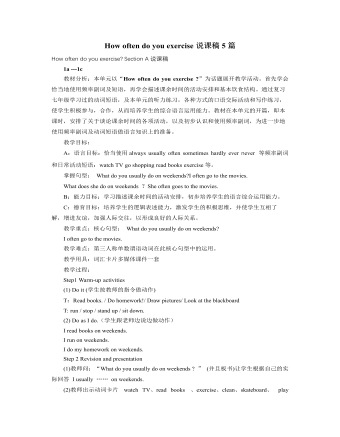
人教版新目标初中英语八年级上册How often do you exercise说课稿5篇
- 页数:22页
- |大小:492.00KB

人教版新目标初中英语八年级上册How do you get to school教案2篇
- 页数:38页
- |大小:273.00KB
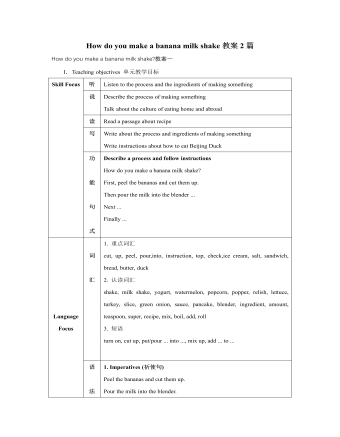
人教版新目标初中英语八年级上册How do you make a banana milk shake教案2篇
- 页数:28页
- |大小:475.00KB
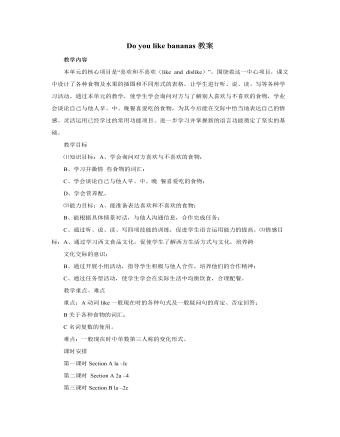
人教版新目标初中英语七年级上册Do you like bananas教案
- 页数:14页
- |大小:94.00KB
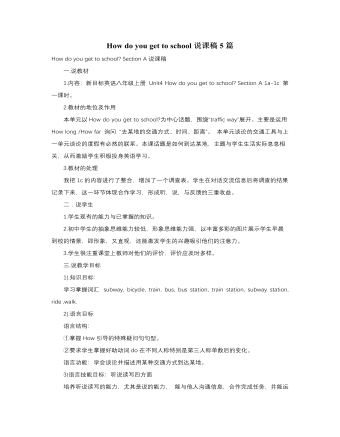
人教版新目标初中英语八年级上册How do you get to school说课稿5篇
- 页数:26页
- |大小:105.00KB
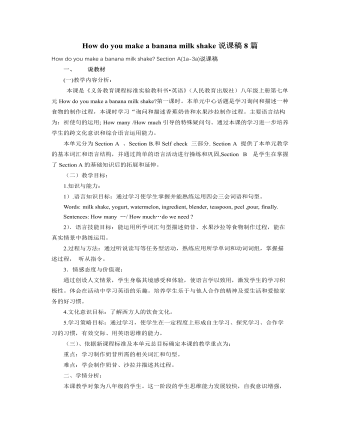
人教版新目标初中英语八年级上册How do you make a banana milk shake说课稿8篇
- 页数:25页
- |大小:123.50KB

人教版新目标初中英语九年级上册How do you study for a test教案2篇
- 页数:30页
- |大小:588.00KB
热门课件教案
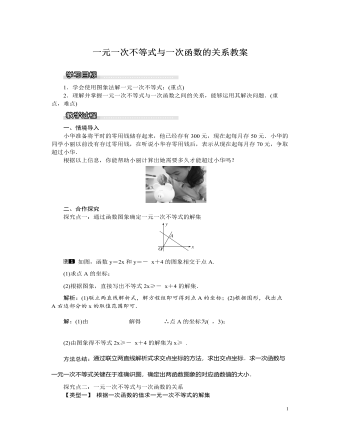
北师大初中八年级数学下册一元一次不等式与一次函数的关系教案
- 页数:2页
- |大小:1M
- 课件教案

人教A版高中数学必修一诱导公式教学设计(1)
- 页数:9页
- |大小:180.22KB
- 课件教案
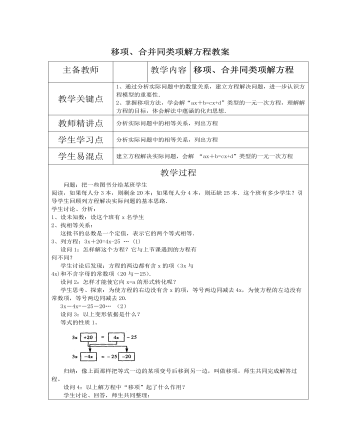
北师大初中七年级数学上册利用移项与合并同类项解一元一次方程教案2
- 页数:2页
- |大小:64.50KB
- 课件教案
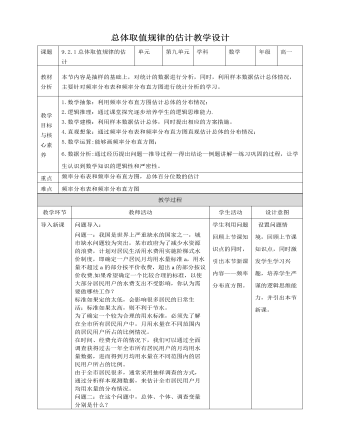
人教A版高中数学必修二总体取值规律的估计教学设计
- 页数:12页
- |大小:821.00KB
- 课件教案
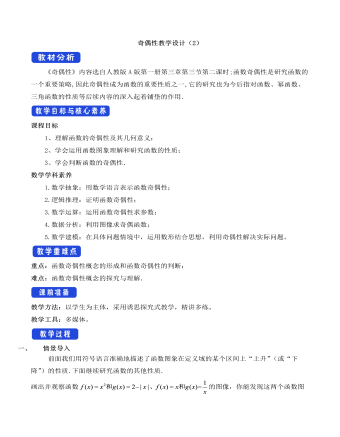
人教A版高中数学必修一奇偶性教学设计(2)
- 页数:7页
- |大小:179.77KB
- 课件教案
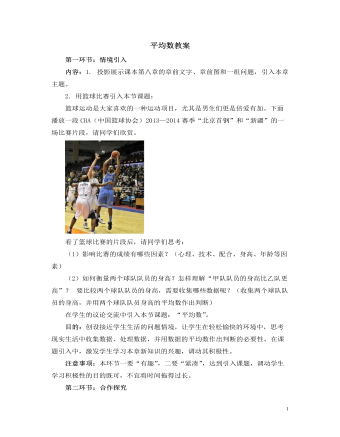
北师大初中数学八年级上册平均数2教案
- 页数:5页
- |大小:1M
- 课件教案
今日更新
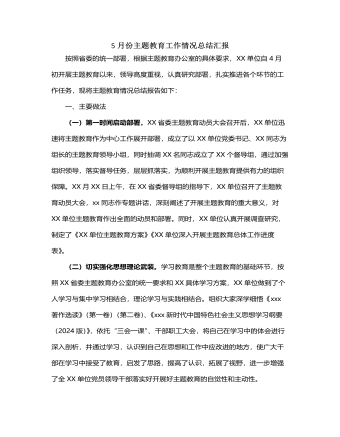
5月份主题教育工作情况总结汇报
- 页数:3页
- |大小:136.87KB
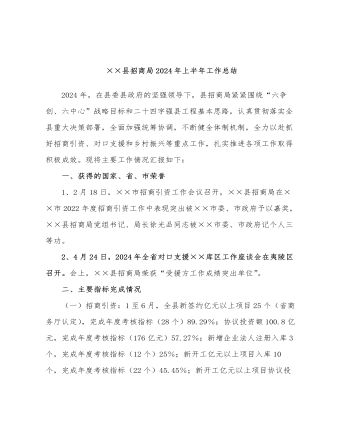
××县招商局2024年上半年工作总结
- 页数:12页
- |大小:142.54KB
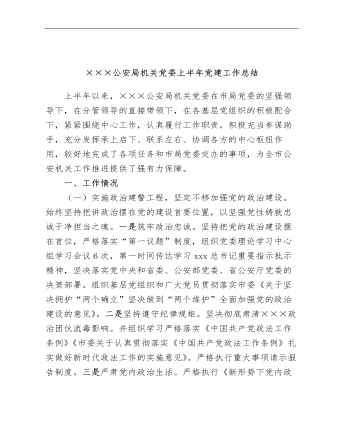
×××公安局机关党委上半年党建工作总结
- 页数:7页
- |大小:186.25KB
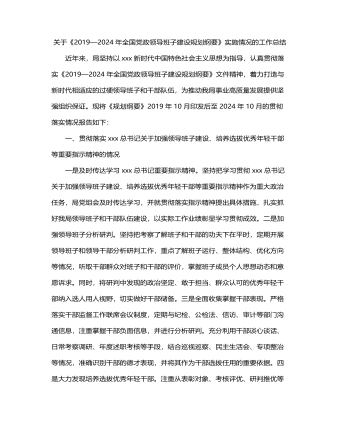
《2019—2024年全国党政领导班子建设规划纲要》实施情况的工作总结3800字
- 页数:6页
- |大小:29.16KB
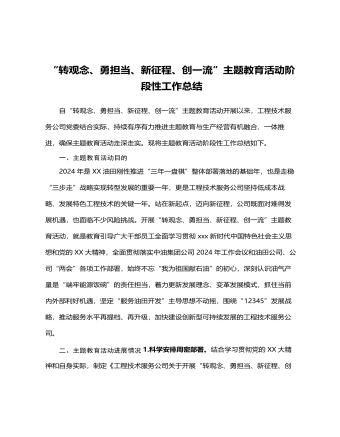
“转观念、勇担当、新征程、创一流”主题教育活动阶段性工作总结
- 页数:3页
- |大小:22.76KB
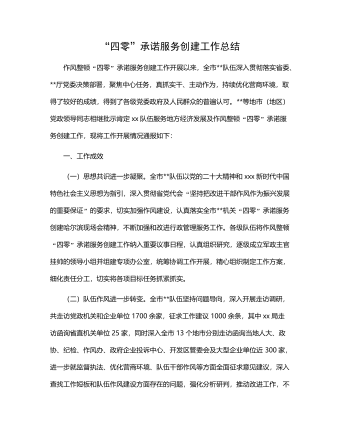
“四零”承诺服务创建工作总结
- 页数:5页
- |大小:39.83KB





